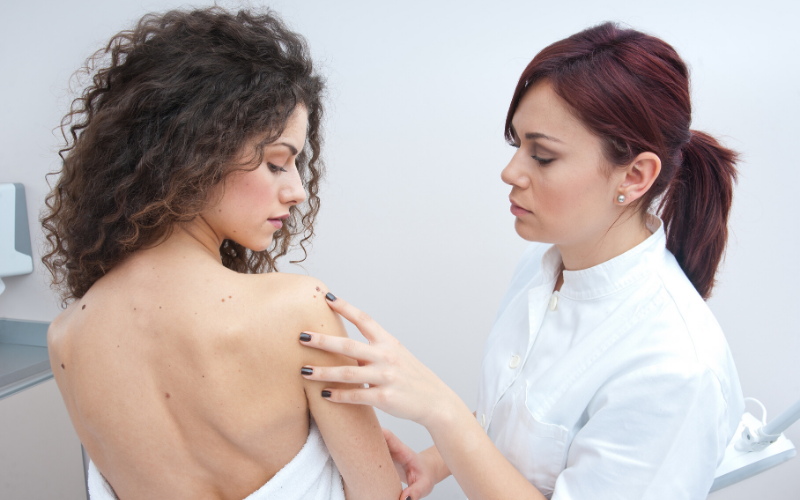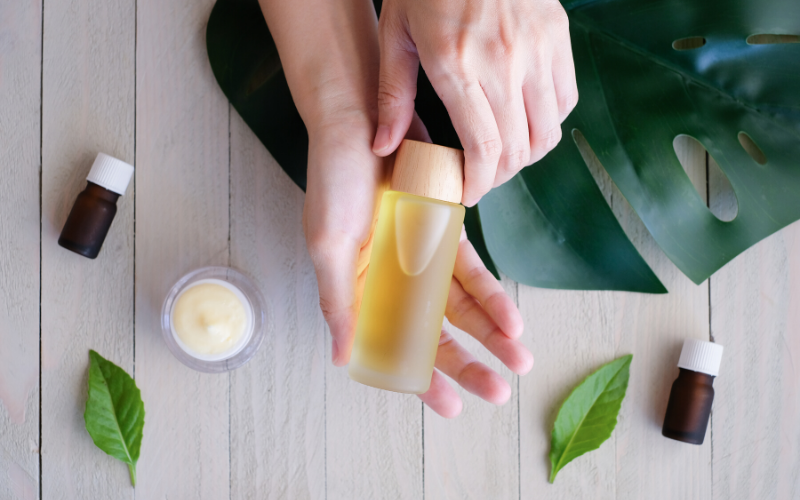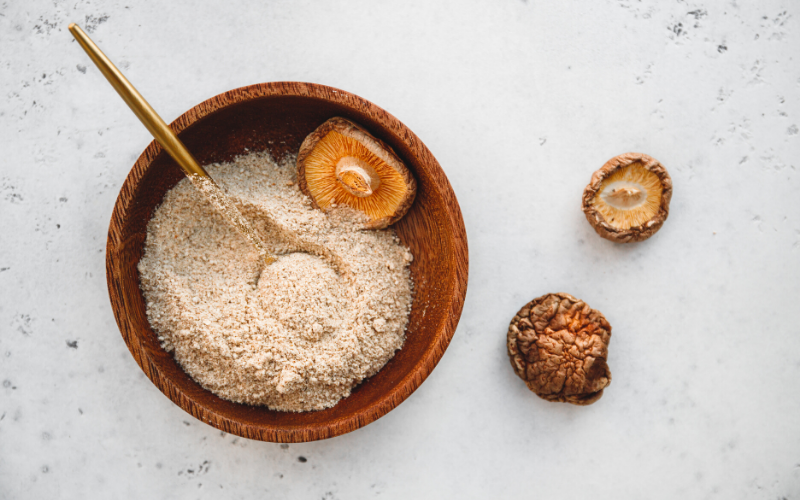Your skin is the largest organ in your body, and it needs tender loving care.
Holistic dermatology offers research-backed skincare solutions using whole-person treatments. From microbiome health to nutrition, integrative is the right choice for dealing with your skin concerns.
Pros and Cons of Conventional Dermatology
Conventional (or mainstream) dermatology has proven options for dealing with skin problems, but often could benefit from a dual, holistic medicine approach.
Prescription Medication
When most people think about Conventional Dermatology, they think of prescription medications that will be given to them to help their skin issue and know that they may have potential side effects. Well, this is true! However, some people believe that all prescription medications are harmful, but is that true IRL (in real life)?
As a Board-Certified Dermatologist, many come into the clinic to obtain prescription solutions for their skin issues. Expert knowledge is to treat and navigate potential side effects.
Conventional board-certified dermatologists have extensive training recognizing signs, symptoms, and related health issues of skin conditions. Dermatologists successfully treat and relieve symptoms and skin concerns that are bothersome to the patient.
For this reason, some say that Conventional Dermatology is reactionary as they are responding to patient’s immediate symptoms and concerns and “all they do is prescribe medications”.
However, I would like to point out a VERY IMPORTANT reason board-certified dermatologists would “react” to symptoms with prescription medications.
The stage of your skin disease is a HUGE factor on whether or not it’s time to prescribe medications or go the natural route or combine natural and prescription treatments.
When you see a board-certified dermatologist in the clinic, your itchy skin is likely in a state of maximum flare-up. Symptoms have likely become unmanageable on your own and nothing you’ve tried is working. You are seeking expert advice on how to find relief.
In that stage, prescriptions may be the best option and it’s OK! Due to advanced technology and research, there are prescription treatment options you have access to that have been clinically shown to help heal skin.
Seeking help from a board-certified dermatologist for prescription options is absolutely advised! They will walk you through your choices for treatment and over the counter options.
However, don’t expect your conventional dermatologist to be well-versed in natural treatments as well. If they have not sought out additional training in nutrition, supplements, naturopathic, integrative or other alternative medicines, they aren’t able to knowledgeably consult on those treatment options.
Alternatively, know that NOT all natural medicine practitioners will have expert knowledge on each skin condition, diagnosis, medication, and treatment. They might not have the training and that’s ok too!
My advice is to see a board-certified dermatologist that has training in both conventional and holistic or integrative medicine. If you’re unable to find one person that specializes in both around your area, then seeing separate practitioners might be the answer. Just be sure that you honor and respect the limitations each one brings.
There is no reason to criticize someone against the training they do not have! Combining treatments is not the best option so be sure to ask about potential interactions.
Do Board-Certified Dermatologists Practice Prevention Medicine?
When skin symptoms are more manageable, prevention can be the topic during follow-up visits with a board-certified dermatologist.
Dermatologists are well-versed in known triggers for skin conditions. They have seen many variations of skin issues during their training and years in practice. Additionally, they can help guide you on how to implement over-the counter (OTC) options to help better manage your skin condition.
Board-certified dermatologists are trained in the use of skin care products and combined with their knowledge of how the skin works they are your best resource to find the right skin care products. This can help avoid a lot of trial and error buying several products before you find one that works, which also can be helpful for your pocketbook!
Board-certified dermatologists also practice preventive medicine when you see them for your skin cancer screening exams.
They have expertly trained eyes for evaluating your skin for risk factors, detecting pre-skin cancers, and skin cancers. If left untreated, some skin cancers can be deadly!
Dermatologists are the only board-certified medical practitioners who have a significant amount of hands-on experience in recognizing and treating the various types of skin cancer.
Board-certified dermatologists also are trained in skin surgery and some pursue additional fellowship training in cosmetic dermatology, Mohs Micrographic Surgery, dermatopathology, or pediatric dermatology, etc.
There are a lot of areas of expertise in the management of skin issues that board-certified dermatologists bring to help you address your skin issues.
Let’s take a look now at how Natural Dermatology works.
What is natural dermatology?
Natural treatment of skin conditions is one of my favorite topics. Natural dermatology is healing your skin with items primarily made from nature.
For example, there are many extracts from plants that can be made into skin care products, supplements, and nutrients available from nourishing foods can help heal the skin from the inside out.
Also, keep in mind that some prescription products are made from natural extracts and ingredients so don’t assume all prescriptions aren’t natural.
Ideally, natural dermatology treatments are safe, effective and are low on potential side effects. They may take longer to impact your skin condition, but this isn’t always necessarily true.
One of the biggest criticisms I hear about natural dermatology is that there isn’t enough research. I agree that this can be true. However, that doesn’t always mean that they don’t work.
There is mounting evidence on the role of nutrition and many skin conditions. But even if there is not enough current research to back up a natural treatment option, that’s not my number one question. I’m mostly more concerned on whether it does harm, doesn’t work at all, or has completely false claims!
If a natural treatment has the potential to be harmful, then my recommendation would address potential risks of use and I may not recommend it at all or recommend its use with caution. If it’s not helpful to anyone, then I see it as harmful and being a waste of time and money.
When a treatment works for some people and not others and hasn’t created harm, then it’s on my radar as an option.
Navigating potential pitfalls, nutritional plans, side effects, or dosage issues with supplements (etc.) requires expertise. This is where the role of natural medicine experts come onto your health care team.
Role of Natural Medicine
When you are exclusively using natural treatment options for your health conditions, I advise that you seek out a local well-trained health practitioner in natural medicine. They are your best resource on:
- Nutrition
- Supplements
- Extracts
- Herbs
- Mind/body
- And more!
In my experience, natural medicine practitioners consider your skin issues as part of another issue with your health. They unwind the current state of your condition using various natural techniques to restore you to optimal health.
There are a lot of options for natural health practitioners and I suggest you research which ones are best for you. Sometimes blending a few natural medicine practitioners on your personal health care team is the magic formula to your optimal health.
Examples of natural medicine practitioners that I work with frequently are:
- Naturopaths
- Traditional Chinese medicine
- Ayurvedic medicine
- Functional medicine
- Homeopathic medicine
- Herbalists
- Chiropractors
- Nutritionists
- Health coaches
- Mind/body coach
- Massage therapists
- Personal trainers
- Acupuncturists
- Hypnotherapists
- And many more!
When To Add In Natural Treatment Options
Implementing natural treatment options when you are healthy is likely to assist you in reaching and maintaining your optimal health. Sometimes you can introduce natural treatments along with prescriptions right away and other times it’s best to wait until your skin issue is more manageable.
Natural treatment options are helpful when you’d like to buffer some side effects of prescription medications. This is where Holistic/Integrative Dermatology comes into the picture.
You don’t have to separate out natural and prescription treatments and pit them against one another. They each have their role in improving your health. I respect and honor the value of both options in my Holistic/Integrative Dermatology practice.
Blending natural, conventional dermatology, and personalizing timing of when to implement is the future of medicine.
What is holistic dermatology?
Holistic/Integrative Dermatology isn’t the complete opposite of Conventional Dermatology nor is it entirely Natural Dermatology. Rather both methods are blended together in a synergistic, personalized balance to address your skin concerns.
There are several things that distinguish Holistic/Integrative Dermatology:
- Holistic/Integrative skincare treats the whole patient, instead of just the skin. I have found that the root causes of skin conditions are often not in the skin. There tend to be imbalances in more than one area of health that lead to and perpetuate skin issues.
- Holistic/Integrative dermatologists tend to be on the cutting edge of science. Instead of waiting decades for new research to be “confirmed” in expensive, huge clinical trials, they constantly look at new research published in respected scientific journals and innovative ways to address skin issues.
- Holistic/Integrative dermatology utilizes the patient as a co-equal partner in determining a skincare plan. You are proactively engaged in your health treatment plan and assist in deciding the best action plan and are open to implementing lifestyle changes as part of your optimal health plan.
- Holistic/Integrative dermatologists have expert training in both dermatology and a natural medicine practice of their choice. They have not just dabbled in natural medicine but have sought out professional training. Here are some examples of professional natural training options:
- Board-certified in Integrative Medicine
- Doctorate in Traditional Chinese Medicine
- Certified ayurvedic medicine practitioner
- Institute for Functional Medicine Certified Practitioner
- Licensed Naturopathic Doctor
4 Principles of Holistic Dermatology
A holistic dermatologist looks at the whole person when prescribing treatment. Instead of treating symptoms, the focus is on addressing the underlying causes of skin diseases.
1. Diet
A few dietary changes can avoid inflammation and promote healthy skin.
Sugar is very problematic. Sugar has been linked to obesity, heart disease, diabetes, liver disease, and even some cancers.
Lay off the dairy. Lactose is among the most common food allergies for a reason.
Stay away from heavily processed foods that can cause inflammation:
- Fast food
- Granola bars
- Margarine
- White bread
- Microwave dinners
- Processed meats
2. Lifestyle Changes
Stress messes with your entire body. I recommend these stress relief methods:
- Being intentional with resting
- Meditation or yoga
- Enjoying the outdoors
- Take time to be with yourself
- Read a sacred text
- Journal
- Practice gratitude and appreciation
A good night’s sleep does a lot for your overall health. To get that sleep, try avoiding caffeine in the afternoon, unplugging from technology before bed, or even aromatherapy.
Studies show a high quality eight hours of sleep can balance your hormone levels. Unbalanced hormones may lead to skin disorders.
Avoid tight clothing or fabrics that don’t allow your skin to breathe. These cake dirt and sweat in your skin and can cause blemishes.
Finally, purify the air in your home by using plants, an air purifier, or simply by opening the windows and allowing fresh air into your home.
3. All-Natural Supplements
Natural supplements are a great way to correct potential problems with your skin.
CBD oil is a potential anti-inflammatory. If your diet or new topical creams are irritating your skin, CBD oil might be a good option.
Medicinal mushrooms (such as lion’s mane or reishi) exhibit antioxidant, anti-aging, and anti-inflammatory properties on your skin. Plus, they can help heal your mind by reducing anxiety and depression.
Niacinamide (a form of vitamin B3) can help clear acne and regulate oil production in your skin. Some research shows niacinamide is as effective at treating acne as prescription antibiotics, without the problems that come with killing the bacteria in your body.
Essential oils, like rosehip or argan, can aid to repair skin and reduce blemishes. (However, not all essential oils are good for your skin, so check out my article for more information.)
Probiotics are “good” bacteria your body needs to thrive. Probiotic supplements help to maintain and restore a healthy microbiome for your skin (and your gut).
4. Leaky Gut Syndrome
It sounds gross, I know. But leaky gut syndrome is a criminally under-diagnosed epidemic. How does your gut relate to your skin, you may ask?
Your gut microbiome is the balance of “good” bacteria in your gut. Many stressors can trigger an imbalance in these healthy bacteria.
This leads to the weakening of the tight junction proteins in your intestines. The intestinal lining is supposed to allow nutrients to enter your bloodstream and keep out pathogens, bad bacteria, and other toxins. Weakened tight junction proteins mean a lot of bad stuff gets into your system.
Now, most of your immune system exists in your gut. And poor immune health can cause many skin issues, including infection, acne, and autoimmune disorders.
Treating leaky gut syndrome is simple. Probiotic supplements help restore good bacteria in your gut. But you can also get probiotics from your diet — sauerkraut, sourdough bread, tempeh, miso, kombucha, even pickles.
The Evidence for a Whole-Person Approach to Skin Health
There is well-respected research coming out every month supporting the idea that a holistic approach to skin health is valid and necessary.
A 2019 study discussed the potentials of mushrooms as natural skincare products. Researchers even suggested the byproduct waste of the mushroom industry could be used to formulate such skin treatments.
A recent overview of available research discussed how the skin disease rosacea is activated by hot beverages, spicy foods, caffeine, alcohol, and even sometimes vanilla. And acne is activated by the increased insulin our Western diets lead to. These researchers suggest healthy nutrition is likely one of the most effective natural treatments.
A scientific paper published in November 2019 explores the implications of the gut-skin axis, giving credence to the idea that leaky gut syndrome influences skin disease.
In Summary
- Holistic dermatology is the science-backed practice of skincare, focusing on prevention, natural remedies first, dietary/lifestyle changes, and treatment of the whole patient instead of just superficial symptoms.
- I recommend cutting sugar, dairy, and processed foods from your diet. Healthy nutrition can be one of the keys to achieving your optimal health.I also suggest stress relief, a good night’s sleep, and home air purification.
- CBD oil, medicinal mushrooms, and probiotics are excellent supplements to improve skin health. Probiotics are especially important because they can restore balance to your gut microbiome.
Sources
- Cartwright, M. M., Graber, E. M., & Stein, G. L. (2020). The Role of Medical Nutrition Therapy in Dermatology and Skin Aesthetics: A Review. Journal of drugs in dermatology: JDD, 19(1), 12. Full Text: https://jddonline.com/articles/dermatology/S1545961620P0012X/1
- Vighi, G., Marcucci, F., Sensi, L., Di Cara, G., & Frati, F. (2008). Allergy and the gastrointestinal system. Clinical & Experimental Immunology, 153, 3-6. Full Text: https://www.ncbi.nlm.nih.gov/pmc/articles/PMC2515351/
- Rippe, J. M., & Angelopoulos, T. J. (2016). Relationship between added sugars consumption and chronic disease risk factors: Current understanding. Nutrients, 8(11), 697. Full text: https://www.ncbi.nlm.nih.gov/pmc/articles/PMC5133084/
- Ginter, E., & Simko, V. (2016). New data on harmful effects of trans-fatty acids. Bratislavske lekarske listy, 117(5), 251-253. Abstract: https://www.ncbi.nlm.nih.gov/pubmed/27215959
- Thompson, C. W., Roe, J., Aspinall, P., Mitchell, R., Clow, A., & Miller, D. (2012). More green space is linked to less stress in deprived communities: Evidence from salivary cortisol patterns. Landscape and urban planning, 105(3), 221-229. Full text: https://researchportal.hw.ac.uk/en/publications/more-green-space-is-linked-to-less-stress-in-deprived-communities
- Hirotsu, C., Tufik, S., & Andersen, M. L. (2015). Interactions between sleep, stress, and metabolism: From physiological to pathological conditions. Sleep Science, 8(3), 143-152. Full text: https://www.ncbi.nlm.nih.gov/pmc/articles/PMC4688585/
- Hatori, M., Gronfier, C., Van Gelder, R. N., Bernstein, P. S., Carreras, J., Panda, S., … & Furukawa, T. (2017). Global rise of potential health hazards caused by blue light-induced circadian disruption in modern aging societies. npj Aging and Mechanisms of Disease, 3(1), 1-3. Full text: https://www.ncbi.nlm.nih.gov/pmc/articles/PMC5473809/
- Petrosino, S., Verde, R., Vaia, M., Allarà, M., Iuvone, T., & Di Marzo, V. (2018). Anti-inflammatory properties of cannabidiol, a nonpsychotropic cannabinoid, in experimental allergic contact dermatitis. Journal of Pharmacology and Experimental Therapeutics, 365(3), 652-663. Abstract: https://www.ncbi.nlm.nih.gov/pubmed/29632236
- Pham-Huy, L. A., He, H., & Pham-Huy, C. (2008). Free radicals, antioxidants in disease and health. International journal of biomedical science: IJBS, 4(2), 89. Full text: https://www.ncbi.nlm.nih.gov/pmc/articles/PMC3614697/
- Mori, K., Ouchi, K., & Hirasawa, N. (2015). The anti-inflammatory effects of lion’s mane culinary-medicinal mushroom, hericium erinaceus (higher basidiomycetes) in a coculture system of 3t3-L1 adipocytes and raw264 macrophages. International journal of medicinal mushrooms, 17(7). Abstract: https://www.ncbi.nlm.nih.gov/pubmed/26559695
- Matsuzaki, H., Shimizu, Y., Iwata, N., Kamiuchi, S., Suzuki, F., Iizuka, H., … & Okazaki, M. (2013). Antidepressant-like effects of a water-soluble extract from the culture medium of Ganoderma lucidum mycelia in rats. BMC complementary and alternative medicine, 13(1), 370. Full text: https://bmccomplementalternmed.biomedcentral.com/articles/10.1186/1472-6882-13-370
- Shalita, A. R., Smith, J. G., Parish, L. C., Sofman, M. S., & Chalker, D. K. (1995). Topical nicotinamide compared with clindamycin gel in the treatment of inflammatory acne vulgaris. International journal of dermatology, 34(6), 434-437. Full text: https://www.semanticscholar.org/paper/Topical-nicotinamide-compared-with-clindamycin-gel-Shalita-Smith/08832c32e34761f19818af1a11c5cea211101ca7
- Lin, T. K., Zhong, L., & Santiago, J. L. (2018). Anti-inflammatory and skin barrier repair effects of topical application of some plant oils. International journal of molecular sciences, 19(1), 70. Full text: https://www.ncbi.nlm.nih.gov/pmc/articles/PMC5796020/
- Valerón-Almazán, P., Gómez-Duaso, A. J., Santana-Molina, N., García-Bello, M. A., & Carretero, G. (2015). Evolution of Post-Surgical Scars Treated with Pure Rosehip Seed Oil. Journal of Cosmetics, Dermatological Sciences and Applications, 5(02), 161. Full text: https://pdfs.semanticscholar.org/8438/184f12f65fd18dbb32d24644413707078657.pdf
- Lio, P. (2019). Leaky gut, leaky skin, or both?. Full text: https://www.dermatologytimes.com/article/leaky-gut-leaky-skin-or-both
- Taofiq, O., Rodrigues, F., Barros, L., Barreiro, M. F., Ferreira, I. C., & Oliveira, M. B. P. (2019). Mushroom ethanolic extracts as cosmeceuticals ingredients: Safety and ex vivo skin permeation studies. Food and Chemical Toxicology, 127, 228-236. Abstract: https://www.ncbi.nlm.nih.gov/pubmed/30922966
- Maarouf, M., Platto, J. F., & Shi, V. Y. (2019). The role of nutrition in inflammatory pilosebaceous disorders: Implication of the skin‐gut axis. Australasian Journal of Dermatology, 60(2), e90-e98. Abstract: https://www.ncbi.nlm.nih.gov/pubmed/30175843
- Szántó, M., Dózsa, A., Antal, D., Szabó, K., Kemény, L., & Bai, P. (2019). Targeting the gut‐skin axis–probiotics as new tools for skin disorder management?. Experimental dermatology. Abstract: https://www.ncbi.nlm.nih.gov/pubmed/31386766






